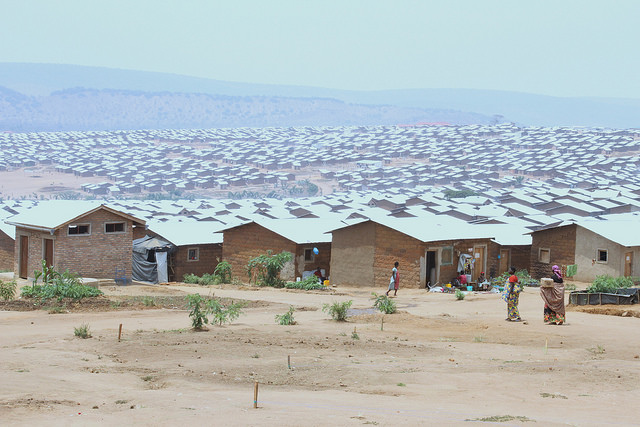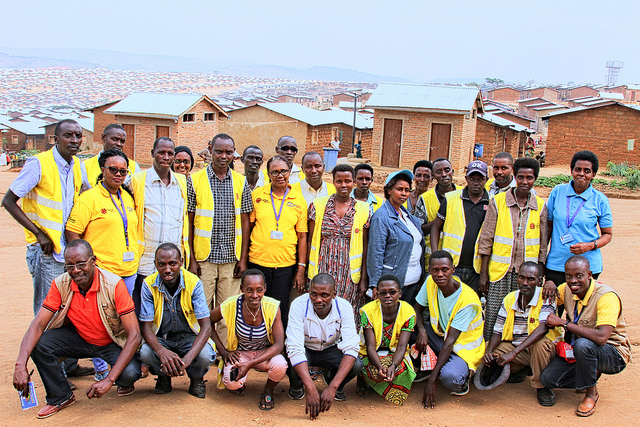“I would die overnight and dry up like a piece of wood.” Mbarushimana Honorata is a Burundian refugee living in Mahama camp in Rwanda. Like many Burundians in the camp, the 84 year old grandmother struggled with the food provided by the UN. The corn and beans they received were hard to grind, require strong teeth and can be tough on the stomach. “It was then that Caritas intervened and saved me from death,” she said.
Since its work in the camp began in 2015, Caritas Rwanda had identified a gap in humanitarian aid for the Burundian refugees: the most vulnerable sectors of the refugee population needed specific nutritional support.
Caritas staff then distributed SOSOMA enriched flour (with sorghum, soya and corn). They gave the flour to nursing mothers, people 60 years plus and the physically disabled. They provided cooked rations to hospitalised patients. “For me, Caritas is my saviour,” said Honorata.

The Mahama Refugee camp in Kirke district, Eastern Rwanda houses over 80,000 Burundian refugees. Photo: Alan Whelan/Trócaire.
Mahama is a sprawling refugee camp in Eastern Rwanda. Set up in 2015, it’s home to more than 50,000 Burundian refugees fleeing unrest. The crisis in Burundi was sparked by President Pierre Nkurunziza’s decision to run for a controversial third term. Since then over 400,000 refugees have fled, a fifth to Rwanda.
Caritas Rwanda with the support of Trócaire and the global Caritas network began aiding the refugees in June 2015 by providing psychosocial help and nutritional support to the elderly, the physically and mentally handicapped, the chronically ill and breast feeding women.
The initial SOSOMA project targeted nearly 4000 people. Its success led to another short-term project aimed at delivering enriched flour to a greater numbers of people. Caritas utilised its network of churches to address another critical need – clothes, shoes and personal hygiene items for women. Caritas staff distributed 14,900 pairs of underwear to women and girls from 12 to 59 years.

Hadidja Mukanukezi, 38, is living with HIV and the food she receives from Caritas is crucial to her remaining healthy.
Photo: Alan Whelan/Trócaire
With no foreseen return to Burundi in sight, the refugee crisis continues. Surveys reveal the refugees are not ready to return home. The construction of semi-permanent housing in the Mahama camp is a sign that refugees will not be staying out for some time. Efforts on the self-reliance among the refugees is now key.
Given the current situation, Caritas’ intervention over the last year has become more long term aimed at providing skills needed for living in the camp, small farming and small income generating activities to sustain the refugees’ livelihoods .
The new activities have focused on: training in peace building and peaceful coexistence, counselling, safety from harassment for women living alone, savings and credit development schemes and the creation of vegetable gardens for family consumption, but also for sale to generate income for female headed households. The vegetables can also be sold to Caritas Rwanda who gives them to chronically ill patients in need of fresh food. As Ms. Honorata said, in this camp, people who live normally are those who have a job or can manage to find a supplement.
Despite a decline in overall funding, Caritas Rwanda remains committed to ensuring the most vulnerable improve their living conditions at the camp.

Caritas Rwanda’s volunteer group is made up of Burundians living in the camp. They help with food distribution. They are also key to Caritas Rwanda’s psycho-social support. Photo: Alan Whelan/Trócaire.
In Burundi, drought is adding to the suffering. Jeannette Nahimana, 40, can barely feed her two small children. The food aid she received from Caritas Burundi is nearly finished and her children will have to go begging.
Jeanette’s family is one of thousands of Burundians living in deplorable conditions because of extreme poverty, climate change and political instability. The provinces of Kirundo in the diocese of Muyinga and Cibitoke in the diocese of Bubanza in northeastern Burundi have been the most affected.
In 2016, Caritas Burundi issued an emergency appeal to the Caritas confederation to support the victims of the lack of food. More than 300,000 Euros were mobilised. Coupons were distributed and Jeannette’s family bought beans, rice, flour and oil. She fed her family and put straw on the roof of her shack.
Jeanette is landless. Her husband sold their property before abandoning them. He’s gone because of the food crisis. She looks for work and may work once a week earning two USD a week, however work is harder to come by every day.
Life in Burundi is not getting better and with it the refugee crisis looks like it’s here to stay.
